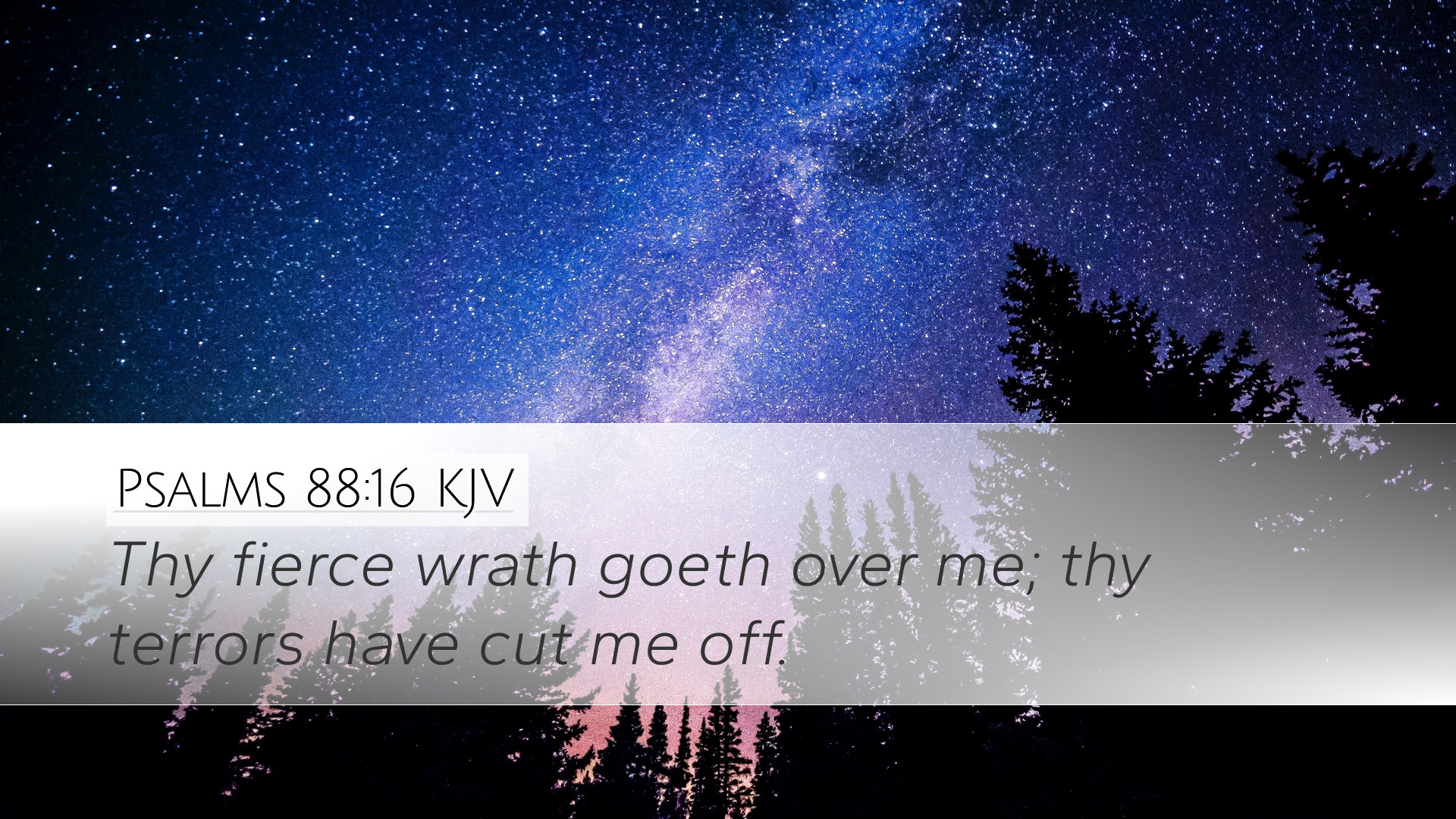Commentary on Psalms 88:16
Psalms 88:16: "Thy fierce wrath goeth over me; thy terrors have cut me off."
Introduction
This poignant verse from Psalm 88 reveals the deep despair and anguish of the psalmist. It highlights a profound sense of abandonment and emotional turmoil, drawing attention to the themes of divine wrath and personal suffering. In the insights below, we will explore interpretations from notable public domain commentaries including Matthew Henry, Albert Barnes, and Adam Clarke, aiming to provide meaningful reflections pertinent to pastors, students, theologians, and Bible scholars.
Context of Psalms 88
Psalms 88 is categorized as a lament psalm, expressing intense personal suffering. The psalmist, identified as Heman the Ezrahite, conveys a sense of complete desolation. The opening lines set the stage for what appears to be a cry from an afflicted soul experiencing not only physical suffering but spiritual desolation. This understanding heightens the impact of verse 16, which vividly describes the emotional and spiritual depths of the psalmist's plight.
Exegesis of Psalms 88:16
The verse employs vivid imagery to express despair. The phrase "Thy fierce wrath" signifies the intensity of God's displeasure that the psalmist feels. Matthew Henry remarks that the "fierceness" of God's wrath implies a severe judgment upon the psalmist. The use of the word "terrors" evokes a sense of relentless fear and anxiety, as Barnes points out, characterizing the overwhelming dread that has consumed the psalmist.
Henry observes that the "terrors" represent not merely a physical threat but an emotional and spiritual one, which aligns with the broader experiences of those longing for God's deliverance in times of distress. Clarke further elaborates that the psychological pain described here surpasses mere physical agony, indicating the psalmist's feeling of being cut off from the source of hope and salvation.
Theological Implications
This verse opens a window into the profound human experience of despair and alienation from God. The acknowledgment of divine wrath raises significant theological questions regarding the nature of God’s justice and mercy. This duality of God's character underscores the complexity of the believer’s relationship with the divine. Barnes notes that the experience of wrath can serve a purpose, acting as a corrective for the soul, even as it leads to feelings of isolation.
Moreover, the juxtaposition of God’s wrath with human suffering invites reflection on the mystery of divine providence. Clarke asserts that while it may seem that the psalmist is utterly forsaken, such a despairing cry can also signal an ultimate hope in God's justice and mercy, often beyond human comprehension. This bears relevance for scholars and ministers as they navigate the labyrinth of suffering within pastoral care and theological discourse.
Applications for Pastors and Theologians
- Pastoral Care: Understanding the profound despair expressed in Psalm 88 equips pastors to empathize with individuals wrestling with grief, depression, or feelings of abandonment by God. This psalm can provide a framework for honoring such emotions in prayer and counsel.
- Theological Reflection: For theologians, verse 16 serves as a point of departure for discussing God's holiness and justice, raising questions about how these attributes coexist with human suffering. Exploring these dialectics can deepen insights into the nature of God.
- Liturgical Use: Psalm 88 may also be embraced liturgically, allowing congregations to give voice to their own suffering while recognizing that lament is a valid and vital aspect of worship.
Conclusion
Psalms 88:16 encapsulates a moment of acute anguish, resonating with the human condition. Through the contributions of established commentators like Henry, Barnes, and Clarke, we glean insights that extend beyond the text, enriching our understanding of suffering, faith, and the complexities of divine-human interaction. As we explore these dimensions, may we be reminded that in our darkest moments, there remains the possibility of hope through God’s unfailing love, even amid our deepest sorrows.


